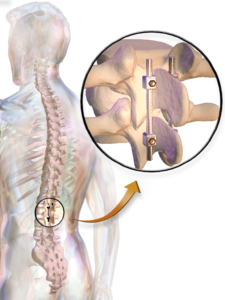Can I Live A Normal Life After Spinal Fusion?
 What is Spinal Fusion?
What is Spinal Fusion?
Spinal fusion is a surgical procedure used to join two or more vertebrae in the spine. The main aim of this procedure is to eliminate motion between vertebrae segments, which can be a source of pain or instability.
When is Spinal Fusion Recommended?
Spinal fusion is recommended in various situations where the stability or alignment of the spine is compromised.
Some common indications include:
- Degenerative Disk Disease: When the cushioning disks between the vertebrae wear down, causing pain and instability.
- Spondylolisthesis: A condition where one vertebra slips forward over another.
- Spinal Stenosis: Narrowing of the spinal canal that causes nerve pain.
- Scoliosis or Kyphosis: Abnormal curvatures of the spine.
- Fractured Vertebra: Especially if it causes instability or compression of nerves.
- Spinal Tumor or Infection: After the removal of a spinal tumor or treatment of an infection, fusion may be needed for stability.
Can I Live a Normal Life After?
There are many people who are able to live a normal life after spinal fusion surgery. But what is meant by “normal” varies based on individual circumstances.
Here are some key points to keep in mind:
- Recovery Period: There is a period of time, which can last several weeks to months, during which activities may be limited. This period is crucial for the fusion to heal properly.
- Activity Modifications: Some adjustments in day-to-day activities might be required. High-impact activities or heavy lifting is likely to be restricted, for example, especially in the initial months following surgery.
- Pain Management: While spinal fusion can alleviate the pain caused by the original condition, some people may experience residual or new pain after surgery, which might require pain management strategies.
- Physical Therapy: Ongoing physical therapy is often recommended after the surgery to strengthen the back and improve flexibility, which can help in getting us back doing normal activities.
- Long-Term Outcomes: Many patients return to their normal daily activities, including work, although they often need to modify certain tasks or work environments.
- Individual Differences: The results of surgery can vary based on a person’s overall health, the specific reason for the surgery, and how well post-operative care and instructions are followed.
- Follow-up Care: Regular follow-up with your surgeon is important to monitor the progress of the fusion and address any concerns that arise.
The goal of spinal fusion is to reduce pain and stabilize the spine. And, while many people experience significant pain relief and improved mobility, it’s important to have realistic expectations. Some level of discomfort or limitation in certain movements might persist.
It should also be noted that there can be a psychological Impact. Recovering from major surgery like spinal fusion can be challenging not just physically, but also emotionally and mentally. Support from family, friends, and possibly professional counselors can be beneficial.
Adopting a healthy lifestyle often becomes a key factor in the long-term success of the surgery, including maintaining a healthy weight, not smoking, and doing regular exercise.
